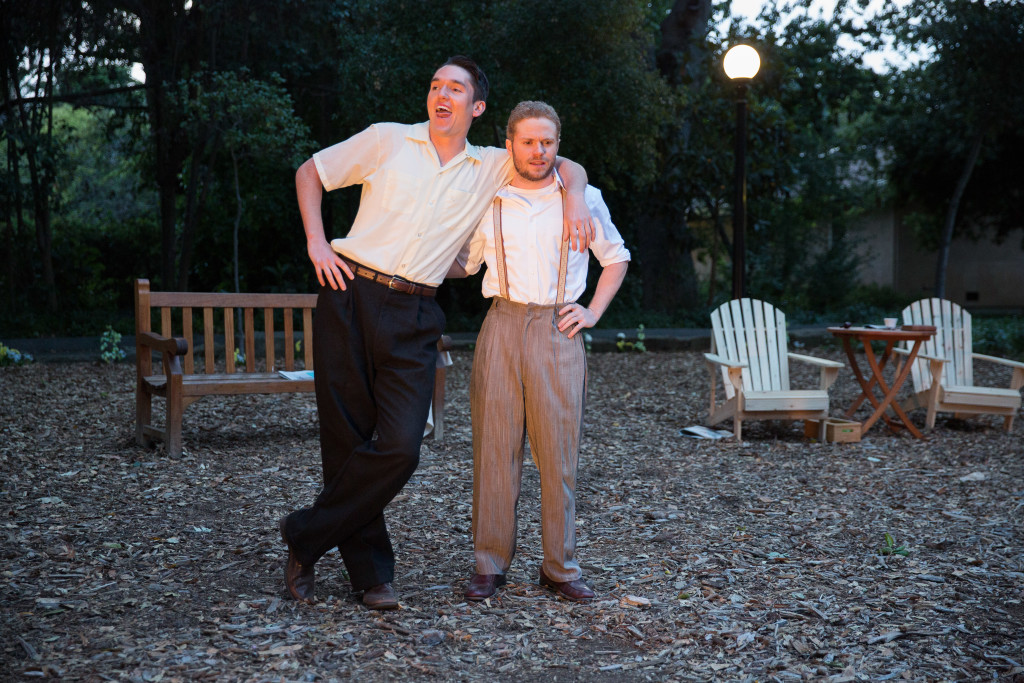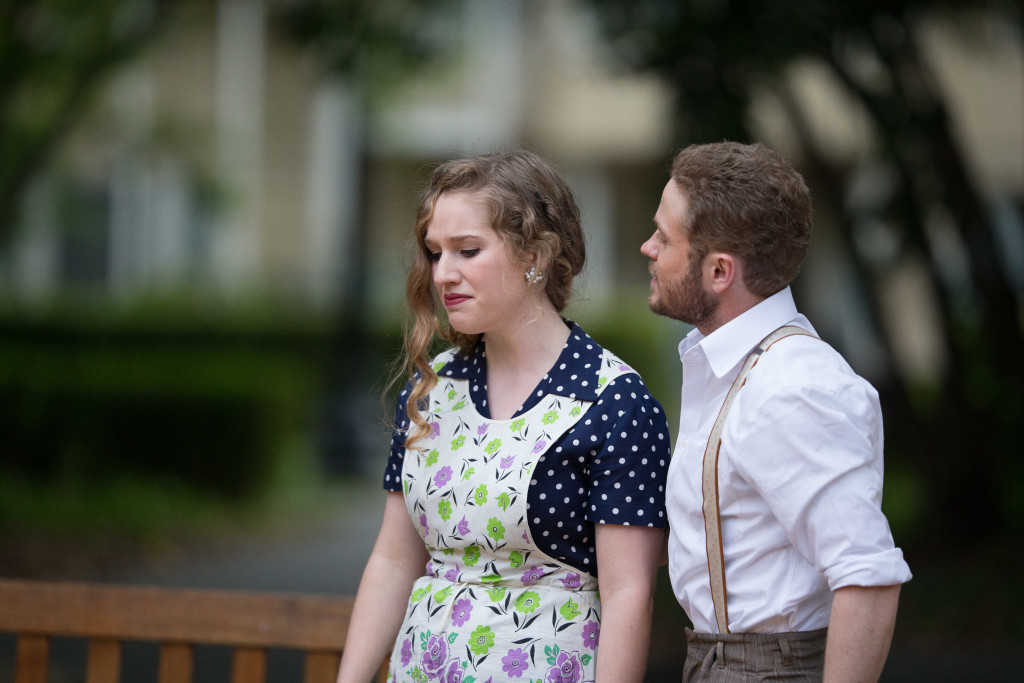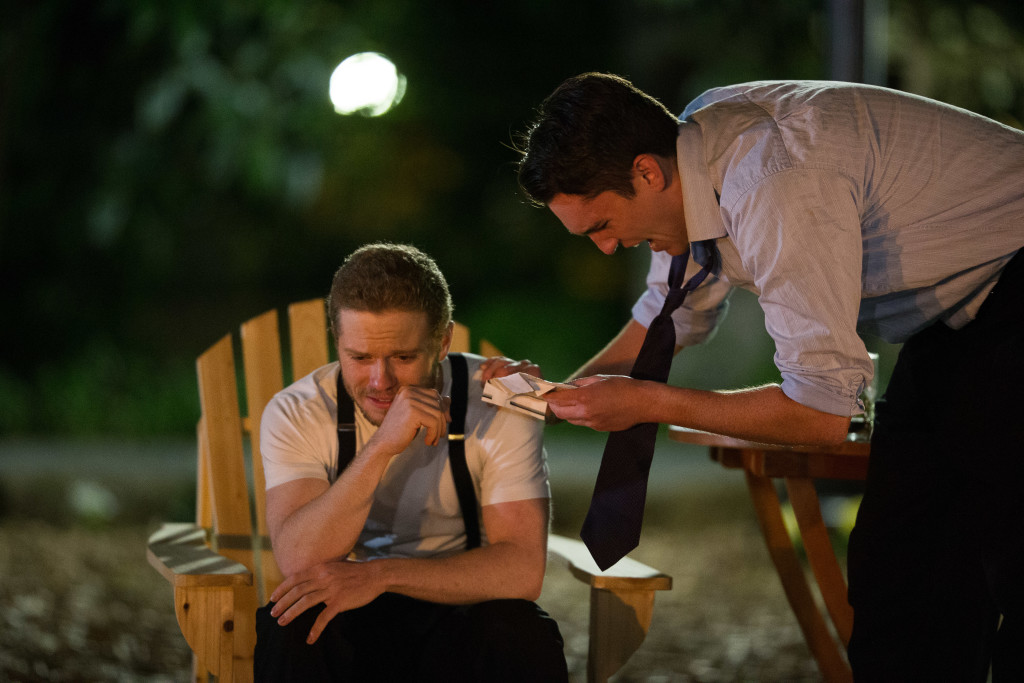
As campus settles back down from the technicolor power and joyful bombast of its spring musical, Hairspray, the Stanford Theatre Laboratory brings us the other end of the dramaturgy spectrum with its production of Arthur Miller’s All My Sons. Entirely staged outdoors, this show’s arena consists of only the most necessary adornments: a cluster of patio furniture, a fallen memorial tree, the occasional 1940s-esque pipe. The natural setting provides the rest: the lanky trees hanging over the production and the pastel-colored Harmony House in the background complete the illusion that we are indeed in the backyard of a wealthy, all-American family still reeling from the recently-ended Second World War. And the cleverly-situated outdoor lighting system allows the audience to see, even as night falls, that these simple comforts and our passionate attachments to them are really the only things people need to create tragedy.
The play focuses on the Kellers, a family both torn apart and built up by the war. Patriarch Joe Keller (played with a blustering, all-American swagger by Austin Caldwell) is a “man in business,” who made his fortune selling machine parts to the military. His former neighbor and business partner Steve Deever— who never graces the stage but whose shadow haunts the proceedings— was convicted of knowingly shipping 21 faulty fighter jet heads to the Air Force, which killed 21 American pilots. Keller managed to convince a court that he was not privy to the sale. Meanwhile, both Keller sons went off to the war and only one, Chris (played by Brady Richter with affable subtlety), came home.
Miller, the playwright of everyday American dystopia, wasn’t interested in watching his characters function within the lies they tell themselves; he wrote to watch them crumble. In All My Sons, the impetus for that unraveling of self-deceptions is the arrival of Annie, the daughter of Mr. Keller’s convicted business partner and the “sweetheart” of the their lost son from the years before the war. Chris wants to marry her— an attempt to build a new future out of his own past that ultimately leads to the family’s undoing.
Chris is that rare person who went off to war and came back with his faultless idealism still intact. Richter— who takes this opportunity to show off his acting range after going for cartoony laughs in the past two Ram’s Head musicals— effortlessly captures Chris’s self-assured boyishness and moral certitude. His righteous clarity and energy stand out amongst the others, the lone source of vitality in a group of people whose objectives lie not in living a life but in preserving their own sense of self and justifying what has already happened. As everyone else desperately practices their own religions of cognitive dissonance, operating according to a rigid set of rules so that they may live with themselves, Chris’s genuineness is both refreshing and disconcerting from the very beginning: it is clear that he is living in a different world than the others, and such blissfully unaware parallelism can only last for so long.
The ability of the whole cast to actually embody that atmospheric tension— the tension between genuine innocence and the ongoing construction of unspoken, self-ameliorating “truths”— speaks to the collective and individual talent of the actors onstage. In this sort of production, in which each character’s expressions and slight movements are not only integral to the story’s thematic progression but are also the main action, any want for dramatic skill would be glaringly apparent. Luckily, the acting is uniformly excellent across the cast, and the characters’ definitive ticks play into each actor’s natural strengths. Alex Cope’s winning, disarming smile makes him the perfect fit for his role as a friendly neighbor; Shelby Mynhier seems to naturally exude the righteous determination of Annie.

Arguably the most important examples of this combination of acting skill and natural fit are Caldwell and Lillian Bornstein’s portrayals of Mr. and Mrs. Keller, respectively. In the first few scenes, their interactions hint at that classic and slightly sexist portrayal of a couple that one sees in decades-old sitcom reruns, drawn with the nuance of a kitchenware commercial: she’s fragile and nagging; he’s cocky and has a penchant for off-color jokes. Of course, this is only a brief, disarming sleight of hand from Miller, before he lays bare the artifice in the comforting truths that the Kellers repeat to themselves, until their insistent repetitions seem plainly ridiculous and, finally, tragic.
Caldwell and Bornstein do justice to Miller’s ideas about the shaky moral patchwork that holds up the illusion of a realized American Dream. Bornstein is excellent in the early scenes as a mother who enjoys a good hat and the womanly work of hosting guests, and Caldwell is equally convincing as a cocky patriarch whose sense of worth derives entirely from his son’s idolizing view of him and the success of his business. However, both actors truly shine in the second act, when it becomes clear that these archetypal, one-dimensional appearances are in fact just that— appearances. The staleness isn’t for the audience but rather for themselves: the Kellers are putting on an act, propped up on pillars that are logically incompatible.
The genius of Bornstein’s performance in particular is clear in one late scene. When Caldwell’s Mr. Keller tries to bully his opposition into believing him, Mrs. Keller snaps at him, “You have nothing to say,” with such silencing power that it becomes clear that she knows more than her husband, or anyone else, about the truth, what it takes to hold her family together, and the disconnect between the two. Mrs. Keller is not just a domesticated simpleton grieving for her lost son, as she seems. Her fragility and hospitality are weapons forged of love and deceit, used to put the end to any arguments based in rationality that might threaten her carefully constructed reality. In a way she is stronger and more cunning than the others.

While Bornstein and Caldwell gradually pull back the deeper layers of their characters, Richter provides a study in honest idealism and the sudden snap that occurs when that idealism gets crushed. Each performance is satisfying in its own way: Richter convincingly embodies both sides of a heartbreaking realization, while Bornstein and Caldwell offer a sustained, slow burn. Mr. and Mrs. Keller practice a very active sort of ignorance, which in itself is intelligence misdirected— a cunning simplicity, a nefarious hospitality meant to support the most fragile and foundational of cognitive dissonances.
The tension between these arcs highlights a question that reasserts itself throughout the play. More than once, Mrs. Keller admonishes Chris, “Don’t be so smart”; yet, in the end, she nearly whimpers, “We’re dumb, Chris, we’re stupid people. We don’t know anything. You’ve got to protect us.” Of course, Mrs. Keller has long been more aware of darker truths than her son, who is blinded by his own idealism. What, then, is “smartness,” and how does it relate to artful self-deception, to unaware virtuousness?
Mrs. Keller’s knowingly constructed, surface-level appearance of “dumbness” and Chris’s energetic yet blind “smartness” each signal a deeper reservoir of its opposite. Neither fully understands how the world works; their failures come from thinking that they have identified a schema that not only organizes the world but allows them to predict a causal chain of events in life. Their consciously-drawn definitions of reality differ in scope and values: are you responsible to the “universe of people,” as Chris assumes, or only to the family members sharing your roof, as his parents maintain? When you realize those same family members are playing by a different set of rules and aspiring to a contradictory set of values, which game do you choose to play? Is it possible to choose?

For most of the play, Chris benefits from the talent of his parents’ act: he can, without qualms, create a clean distinction between the darkness of man and war and the perceived goodness of own father, whom he honestly believes to be “better” than the others. When that illusion finally shatters, both Chris and the audience are left wondering what his idolization was truly rooted in— his honest belief in his father’s goodness, or the bond between a father and son in and of itself?
Images courtesy of Frank Chen
